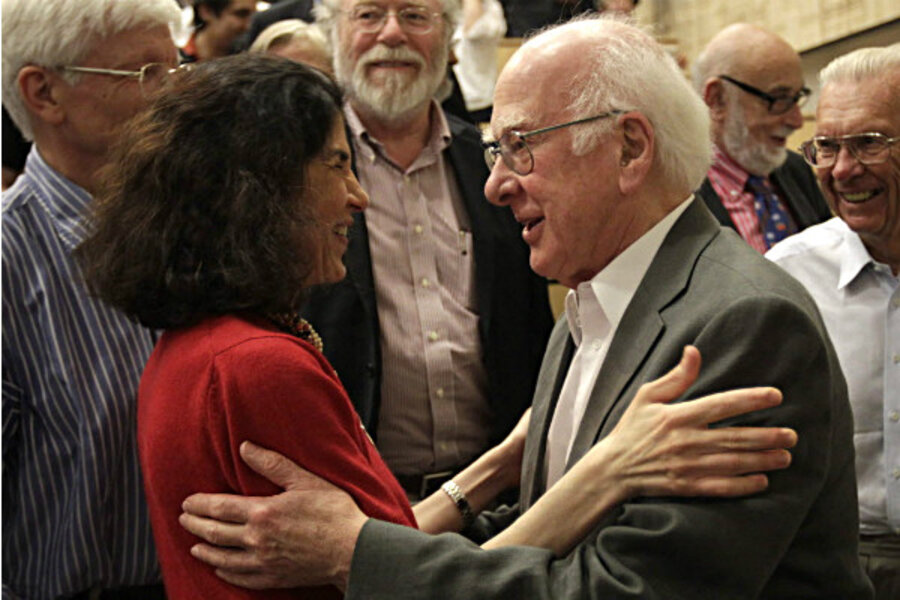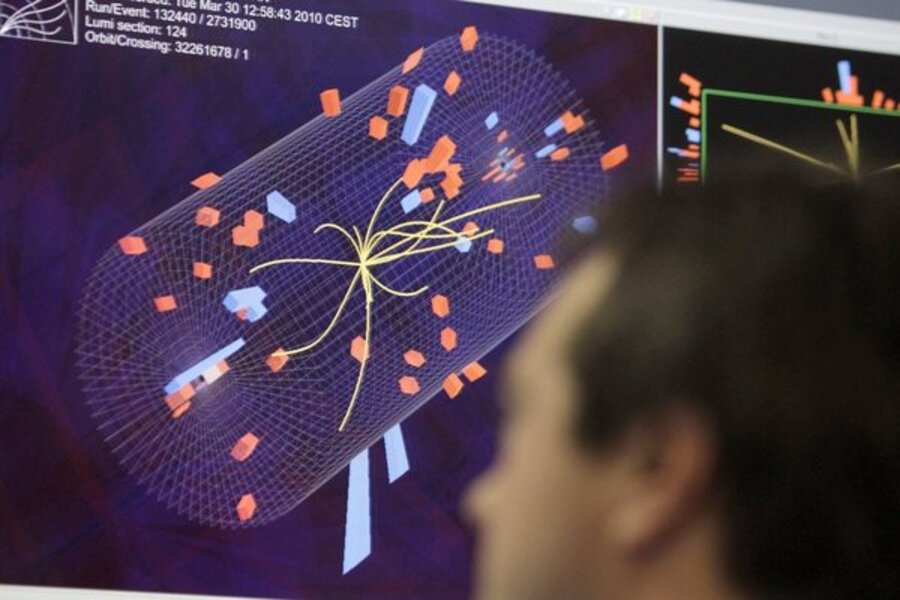Higgs boson: So who is getting the Nobel?
Loading...
There's the science, and then there's the glitter. As researchers celebrate the best-yet evidence of the existence of the Higgs boson, some are already thinking about who's going to get the Nobel Prize in physics for the seminal discovery.
Stephen Hawking told the BBC that he thinks Peter Higgs, who first theorized about the particle, should get the prize. But the award can go to as many as three people and even to groups, though the science Nobel committees haven't yet seen a need to recognize groups, says Sven Lidin, chairman of the Nobel committee in chemistry. So who else may share the podium with Higgs?
The talk around the physics prize for the Higgs boson is especially hot because so many people were involved in the research teams that worked at the European Organization for Nuclear Research (CERN). Modern physics is bigger than ever.
The great majority of research performed since the 1940s has been conducted by teams of people working in laboratory groups, said Tom Broman, a historian of science at the University of Wisconsin, Madison.
"The problem of making awards to individuals has been exacerbated, but by no means created, by the scaling up of research projects," Broman said in an email.
Nowhere is scientific teamwork more evident than in physics. Many physics experiments today use instruments that cost millions or billions to build, such as the Hubble Space Telescope or the Large Hadron Collider at CERN. These complex instruments require many scientists to run them, to analyze data from them, and to share them, as no small group could afford to build a space telescope just for itself. So when something exciting comes out of those instruments, there are many people who contributed to the discovery.
CERN announced "strong indications for the presence of a new particle, which could be the Higgs boson" on Wednesday (July 4). The existence of the Higgs boson would lend crucial support for the Standard Model, a major physics theory about how matter in the universe works.
A modern prize is a collaborative one?
"A situation like this certainly puts those seeking to recognize individuals in quite a quandary," said Adam Riess, an astronomer at Johns Hopkins University in Baltimore who won the Nobel Prize in physics last year.
Riess' own win sparked some conversations about prizes in modern physics. He used the Hubble Space Telescope to measure supernovae, concluding the universe is accelerating in its expansion, and shared his Nobel with two other scientists from two different teams. One of the teams was made up of about 20 people and the other, about 35. "So there were many more people who were involved," he said.
Finding just three people to recognize often means looking for people who contributed just slightly more than others, Riess said. He compared Nobel-awarding to his work as a professor. At the end of the semester, he has to decide how to divide the top of the class into A and B grades. "You look for a natural break, but it doesn't always exist," he said. "This quandary isn't just in prizes. It's all facets of life." [The 9 Biggest Unsolved Mysteries in Physics]
While they might pretend otherwise sometimes, many scientists still care deeply about recognition. "Scientists are people, too," Riess said. Although each category's Nobel is worth about $1 million, Riess said, "It's not a money issue, generally. It's being able to identify yourself as being involved in work that was recognized as being important."
He would like to see more science awards that don't have a limit on the number of winners. He cited the Gruber Prize in cosmology, which has recognized groups, as an example. "It's a more modern view. That's the way science is done now," he said.
Individual heroes still exist
The Nobel Committee's Lidin does not think having multiple award winners is a problem. The Royal Swedish Academy of Sciences is allowed to award the science Nobels to groups, he said, just as the Nobel Peace Prize has gone to groups such as the Intergovernmental Panel on Climate Change in 2007 and the United Nations in 2001. The academy simply hasn't needed to award groups yet, he said.
"Even large groups are normally driven by individuals," he said. So far, the science Nobel working groups have looked for those leaders. It may be more difficult to identify leaders in large groups, he said, but that doesn't mean they don't exist.
The true difficulty with awarding Nobels now is that as the body of scientific knowledge grows, it's getting harder to find standout discoveries, Lidin thinks. Riess also talked about how most science moves incrementally, but the Nobel Prize committees look for the rarer large leaps — the "highlight reel" of science, Riess said.
"The sort of discoveries that change entire subjects are very rare these days," Lidin said, though he later noted that perhaps scientists only feel that way because milestones look clear in hindsight, whereas people may not recognize a revolution in science is happening while they're experiencing it.
The Nobel committees are well known for their one- or two-decade lag in awarding prizes. The astronomers who won last year's physics Nobel wrote about the accelerating universe in the 1990s, while the discovery of the structure of DNA, which James Watson and Francis Crick first detailed in a study published in 1953, wasn't recognized by the Nobel Prize in physiology or medicine until 1962. It takes such a long time because it isn't clear until later how important certain work is, Lidin said.
The expected awards for the Higgs boson discovery are a special case. People have been searching for the particle for years and they knew it would be a milestone once discovered. Lidin said he can't talk about the physics Nobel for this year, but he is sure the physics committee has thought carefully about the problem of awarding large groups. He reiterated that identifying deserving discoveries is more likely to be a problem for the physics committee than identifying the leaders in a group involved in one discovery.
Taking the longer view, Reiss said that whoever gets the Nobel and other prizes "is not really a big problem" compared to the solving the problems of nature.
You can follow InnovationNewsDaily staff writer Francie Diep on Twitter @franciediep. Follow InnovationNewsDaily on Twitter @News_Innovation, or on Facebook.
- 8 Surprising High-Tech Uses for Helium
- Will the Real Higgs Please Stand Up? (Infographic)
- 10 Technologies Poised to Transform our World
Copyright 2012 InnovationNewsDaily, a TechMediaNetwork company. All rights reserved. This material may not be published, broadcast, rewritten or redistributed.








